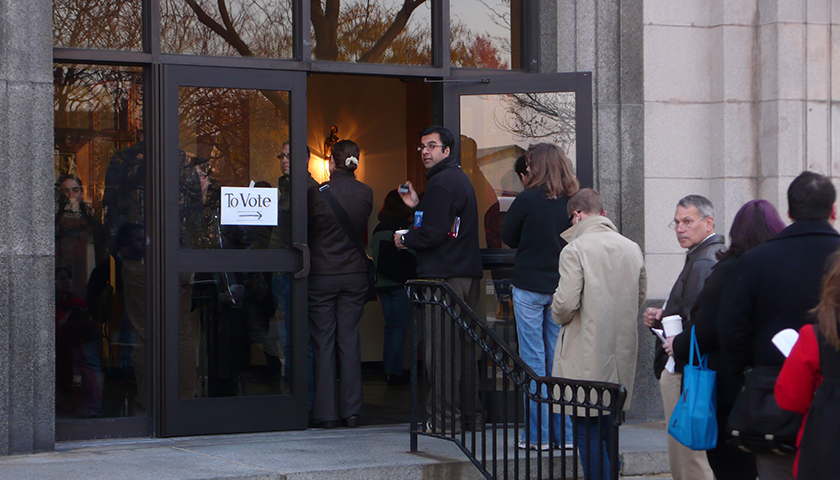by Kim Crockett
Senator Joe Manchin (D-W.Va.) has upset the plans of his party leaders to jam though hyper-partisan legislation and tip the electoral balance in favor of Democrats for all future elections. Manchin, a secretary of state before he was elected governor, is refusing to end the filibuster, or to vote for H.R. 1, the cynically named “For the People Act.” Writing in the Charleston Gazette Mail, Manchin contends:
The right to vote is fundamental to our American democracy and protecting that right should not be about party or politics. Least of all, protecting this right, which is a value I share, should never be done in a partisan manner. . . . I believe that partisan voting legislation will destroy the already weakening binds of our democracy . . .
H.R. 1, which Majority Leader Chuck Schumer (D-N.Y.) plans to bring to the floor for a vote this week, proposes a near-complete takeover of elections by Congress; it would replace most state election laws, substituting new laws that in some instances are even worse than the “progressive” approach take in states like Minnesota and California. The proposed law also taps the people’s tax revenue for political campaigns and hijacks state rules on redistricting.
H.R. 1 would end a 230-plus-year tradition of entrusting the administration of elections to the states, while giving Congress a robust oversight role. The power-sharing tradition comes straight out of Article 1, Section 4 of the Constitution:
The Times, Places and Manner of holding Elections for Senators and Representatives, shall be prescribed in each State by the Legislature thereof; but the Congress may at any time by Law make or alter such Regulations . . .
But now the Democrats, anxious to lock down the dominance of their party before voters get to weigh in on their performance in 2022, have proposed a coup against federalism and the “state laboratories” that ensure we are a self-governing, self-correcting, and innovative people with a robust two-party system.
H.R. 1 is wrapped in the patriotic language of the flag but the more than 800-page bill could not be more hostile to the ideal of self-governance embodied in the phrase, “For the People.”
No doubt Manchin’s bold leadership and brave rejection of H.R. 1 come from his experience both as a governor and a secretary of state. If he voted for the bill, he would be saying that West Virginia was not capable of running fair elections. He knows otherwise, though he no doubt would agree that some states have better election laws, and better administration of those laws, than others.
For example, West Virginia requires voters to present identification and if they cannot, the ballot is treated as provisional. Minnesota does not require identification, nor does it have provisional balloting. H.R. 1 would rewrite that common sense requirement by effectively eliminating voter ID.
So two cheers for Manchin.
Why only two cheers? Because Manchin, while wisely seeking bipartisanship as he leads the Senate away from the cliff of what he calls “partisan voting legislation” that “will destroy the already weakening binds of our democracy” has embraced H.R. 4, legislation named after the late U.S. Representative John Lewis that attempts to “update” the Voting Rights Act of 1965 (VRA).
According to J. Christian Adams, president of Public Interest Legal Foundation:
The John Lewis Voting Rights Act is even worse than H.R. 1 . . . It will put Washington bureaucrats in total control of our elections. Partisan Department of Justice bureaucrats will have complete power to veto all election changes from voter ID requirements to changes in polling places and hours. States must continue to run their own elections. Power should be kept with the people and not with the swamp in Washington.
Section 5 of the VRA addressed “Jim Crow” discrimination against minority voters, namely blacks in Democratic southern states, though Alaska and Arizona were targeted, too. Nine states, and a small number of counties around the country, were required to get “pre-clearance” for changes to election laws until 2013, when the Supreme Court ruled in Shelby County v. Holder that the formula the Justice Department used to identify jurisdictions for pre-clearance scrutiny was unconstitutional, effectively ending pre-clearance. It was a recognition by the court that America in 2013 was not the America of 1965.
Despite that Supreme Court ruling, H.R. 4 resurrects pre-clearance, picking up on unhinged left-wing and corporate media claims of “racist” voting laws, but this time Congress would put the entire country under the same kind of federal supervision reserved for the Jim Crow states of 1965. Does Manchin really think America is less capable of running fair elections today than in 1965?
On top of giving the nod to H.R. 4, Manchin is trying to put together a “bipartisan” bill that sounds a lot like state-based legislation, addressing things like voter ID and early voting. As Senator Mitch McConnell (R-Ky.) said, “It still retains S1’s rotten core,” he added. “An assault on the fundamental idea that states, not the federal government, should decide how to run their own elections.”
Manchin has so far played a heroic role in protecting the filibuster and defending a constitutionally sound approach to elections. Let us pray that he does not cave to intense pressure to craft a bill that throws federalism and We the People into the deep swamp of D.C.
– – –
Kim Crockett is a lawyer and voting rights advocate. She is a legal policy advisor to the Minnesota Voters Alliance (MVA) and chairman of For Kids And Country. Crockett is a contributor to local and national forums including Intellectual Takeout, Alpha News, the Minneapolis Star Tribune, the Wall Street Journal, Think Minnesota and National Review Online.
Photo “Going to Vote” by Katie Hargrave CC 2.0.




